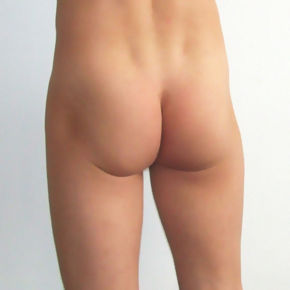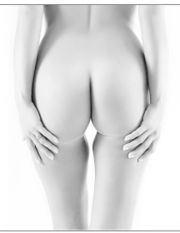Buttocks

The buttocks (often called butt, buns, bum, booty, ass, arse, rear end or backside) are the two fleshy prominences covering the posterior aspect of the of the anatomy located on the posterior of the pelvic region.
Contents[hide] |
Punishment
Corporal punishment is often delivered on the buttocks, in the form of spanking, caning or whipping. This is especially true for lighter punishment and domestic discipline. It should be noted that corporal punishment is not only something experienced within BDSM as a sexual fetish. Just because the buttocks are being used for receiving pain, does not imply that the recipient is consenting nor that it has anything to do with BDSM. The buttocks are usually not exposed, making the punishment invisible to outsiders and therefore keeping any play such as caning them a private activity.
While there are many nerve endings in the area (ensuring substantial pain), there is relatively little risk of the victim sustaining long-term injury since internal organs are unlikely to be affected.
Arousal
Viewing a pair of buttocks of the desired gender is sexually arousing for many, but not all. The sexual aesthetics of the buttocks vary greatly from culture to culture, with some finding leaner buttocks attractive while some find extremely fatty buttocks desirable, from one period of fashion to another and even from person to person.
Bare bottom
Depending on the context, exposure of the buttocks can cause feelings of shame, embarrassment or humiliation in a non-exhibitionist person and having to bare them, especially in public, for punishment or simply by order of the dominant can be humiliating.
Bare buttocks will often cause embarrassment or amusement in a non-voyeurist audience.
In some societies, bare buttocks are about as likely to be censored as bare breasts [1].
Connotations
Because the butocks are not normally publicly exposed, some Masters choose this location when branding their slave. For the same reason, the buttocks are a poor choice for ornamental body markings meant for the public.
Willfully exposing one's own bare buttocks as a protest, a provocation or for fun is called mooning. Mooning someone is generally considered an act of and for the young, but some adults — especially intoxicated — have been known to practice mooning as well.
A wedgie is pulling someone's undergarments or swimming trunks up through their 'crack' to be hauled over the top of the victim's pants, sometimes partially baring the victim's buttocks.
It is no coincidence that the English verb to spank is the only one specifically meant for physical discipline of a specific part of the body, and various other languages have terms specifically referring to spanking; in many punitive traditions, the buttocks are the preferential target for painful lessons, from educational to judicial, as offering them for punishment (especially bare) adds a psychological dose of embarrassment and sexual humiliation to the pain, which can be meted out with less risk of longterm corporal harm then elsewhere.
Anatomy
The buttocks are formed by the masses of the gluteal muscles or 'glutes' (the gluteus maximus and gluteus medius) superimposed by a layer of adipose tissue (fat). The superior aspect of the buttock ends at the iliac crest, and the lower aspect is outlined by the horizontal gluteal crease. The gluteus maximus has two insertion points: 1/3 superior portion of the linea aspera of the femur, and the superior portion of the iliotibial tractus. The masses of the gluteus maximus muscle are separated by an intermediate gluteal cleft or "crack" in which the anus is situated.
The buttocks are what allows people to sit upright without needing to rest their weight on their feet as quadruped (i.e. four-legged) animals do.
While women and boys generally have smooth so-called 'baby-bottoms', adult men have varying degrees of hairgrowth, as on other parts of their body.
Fashion
In most cultures with a (partial) nudity taboo, this specifically applies to the buttocks (as usually to the most erogenous zones), so mainstream garments generally cover them completely, even when that is not a practical requirement. An example of another attitude in an otherwise hardly exhibitionist culture is the Japanese fundoshi.Clothing can be used to accentuate the buttocks. Some articles are designed specifically to show off the buttocks or to expose them, both outer or single layer garments and underwear (visible only in the bedroom or locker room). Wearing only thong underwear or a black vinyl dress with a large hole cut out of the back might be examples. Wearing thong underwear with pants is done to hide "panty lines", creases in the pant caused by certain underwear that breaks the smooth line of the body. Both of these choices are undertaken for style. However, some articles merely have utilitarian features. The butt flap in long underwear (union suit type), used to allow baring only the bottom with a simple gesture (as for hygiene), is a good example. That flap was so ubiquitous that it was used in cartoons and comics for generations.
Emphasis on one part or another of the body, especially the female body, tends to shift with generations. The 1880s were well-known for the fashion trend called the bustle, which provided even the skinniest woman with seemingly huge buttocks. Like long underwear with its flap, this clothing style was acknowledged in popular media for generations afterward. The popularity of this fashion is shown in the famous Georges Seurat painting Sunday Afternoon on the Island of La Grande Jatte in the two women to the far left and right.
Later, the cleavage of the buttocks could be exposed by some women as fashion dictated trousers be worn lower.
Popular culture
There are endless references, e.g. dozens of movie productions with the keyword buttocks or a mention in the English title on them [2], even during the days of the Hays Office. The rules seemed to be that the buttocks could be referenced, but only in a presumably non-sexual context, like spanking of a child or in a humorous situation.
Early in the 1939 movie The Wizard of Oz, Uncle Henry is holding the gate open for Miss Gulch, and at a seemingly appropriate time he lets it go, and it swats the disagreeable old lady in the rear, emphasized by a musical "thunk" on the soundtrack's underscore.
There is a scene in the 1942 movie Yankee Doodle Dandy in which Cohan's father wishes to punish his disobedient son. He can't hit him anywhere that would show, or that would otherwise impact the family's vaudeville act. The frustrated father finally says, "Here's one place with no talent!" He turns young George over his knee and begins spanking, as flour (left over from a stunt in the preceding stage show) flies up and emphasizes the apparent impact of the blows.
The comic character Ado Annie in the 1955 movie musical Oklahoma finds herself on the receiving end of this subject at least twice. First, she mentions something (not quite getting the point) about having been compared to a Persian cat, because they both "have soft, round tails". Then, during the song The Farmer and the Cowman, she makes a funny comment, and Aunt Eller swats her on the bottom.
The 1956 horror film The Bad Seed has a fairly silly postscript ending in which the mother spanks her naughty child, for having murdered several people during the course of the film's plot.
In 1966 Yoko Ono made a roughly 90 minutes long experimental film No. 4, colloquially known as Bottoms which consists of nothing more than footage of human buttocks in motion while the person walks on a turntable.
At one point in the 1971 James Bond adventure Diamonds Are Forever, Bond (Sean Connery) stashes a computer tape into the back of Jill St. John's bikini bottom, whispering "Your problems are all behind you now." Later, the villain (Charles Gray) notices this object and says, "We're showing a bit more cheek than usual, aren't we, Miss Case?" before roughing her up for her treachery.
By the 1970s, television was also becoming more liberal. There was an episode of The Bob Newhart Show in which it came out that Bob's secretary, Carol, had a tattoo on her behind, which she was now looking to have removed. Bob seemed to sympathize, and then commented with a slight smirk, "We don't want you to be the 'butt' of any jokes!"
In an infamous episode of The Newlywed Game from 1977, host Bob Eubank asked the husbands, "What's the most unusual place you've made love?" In the next segment, one wife who was asked that question came back with, "Is it in the ass?" The incident itself was long thought to be an urban legend, but it actually did happen, as revealed on a "Game Show Bloopers" TV special in 2002. (See www.snopes.com.)
In a nighttime talk show, Lee Marvin happened to mention that he had received a Purple Heart during World War, and the host asked him where he was shot: "In the ass!" It being late at night, and merely truthful and not lascivious, the line was not bleeped.
The 1984 mockumentary This Is Spinal Tap contained the song "Big Bottom" featuring the lyric Big bottom, big bottom, Talk about bum cakes, my girl's got 'em, Big bottom drive me out of my mind, How could I leave this behind?
In the 1985 movie Pee Wee's Big Adventure, star Paul Reubens ("Pee Wee Herman") responds to someone who says, "Yes, but..." with the comment "Everyone I know has a big 'butt'!"
In the 1994 movie Forrest Gump, the title character has just received a medal from President Lyndon Johnson, who asks Forrest where he was shot: "In the buttocks, sir." The President responds, "Oh that must be a sight, I'd kinda like to see that!" and to everyone's surprise, Forrest, misunderstanding him, turns around and drops his trousers.
The 1999 film Entrapment was both lambasted and praised as an excuse to show a closeup image of Catherine Zeta-Jones raising her rear end. Zeta-Jones' buttocks are, according to one reviewer, "the true star of the film."
Agnetha Fältskog of ABBA was famous in the late 1970s for her spandex pants and having "The Sexiest Bottom in Europe", as the press described it. When she asked if this was true, her rejoinder was "How can I answer that? I don't know, I haven't seen it".
In the latter part of the 20th century, this body part really "came out of the closet" and has become a frequent popular culture topic, as with the famous entertainer Jennifer Lopez, whose rear end is as often discussed as Dolly Parton's breasts were at the height of her career.
See also
Sources and references
- Etymology on line one can also search for most synonyms
- For synonyms: On-line thesaurus
- Catholic Encyclopaedia passim
External links
- "The Muscles and Fasciæ of the Thigh" (by Henry Gray) at "Anatomy of the Human Body", 1918.




